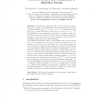Free Online Productivity Tools
i2Speak
i2Symbol
i2OCR
iTex2Img
iWeb2Print
iWeb2Shot
i2Type
iPdf2Split
iPdf2Merge
i2Bopomofo
i2Arabic
i2Style
i2Image
i2PDF
iLatex2Rtf
Sci2ools
122
click to vote
CRYPTO
2007
Springer
2007
Springer
On Secure Multi-party Computation in Black-Box Groups
Abstract. We study the natural problem of secure n-party computation (in the passive, computationally unbounded attack model) of the n-product function fG(x1, . . . , xn) = x1 · x2 · · · xn in an arbitrary finite group (G, ·), where the input of party Pi is xi ∈ G for i = 1, . . . , n. For flexibility, we are interested in protocols for fG which require only black-box access to the group G (i.e. the only computations performed by players in the protocol are a group operation, a group inverse, or sampling a uniformly random group element). Our results are as follows. First, on the negative side, we show that if (G, ·) is non-abelian and n ≥ 4, then no n/2 -private protocol for computing fG exists. Second, on the positive side, we initiate an approach for construction of black-box protocols for fG based on k-of-k threshold secret sharing schemes, which are efficiently implementable over any black-box group G. We reduce the problem of constructing such protocols to a combinato...
| Added | 07 Jun 2010 |
| Updated | 07 Jun 2010 |
| Type | Conference |
| Year | 2007 |
| Where | CRYPTO |
| Authors | Yvo Desmedt, Josef Pieprzyk, Ron Steinfeld, Huaxiong Wang |
Comments (0)

